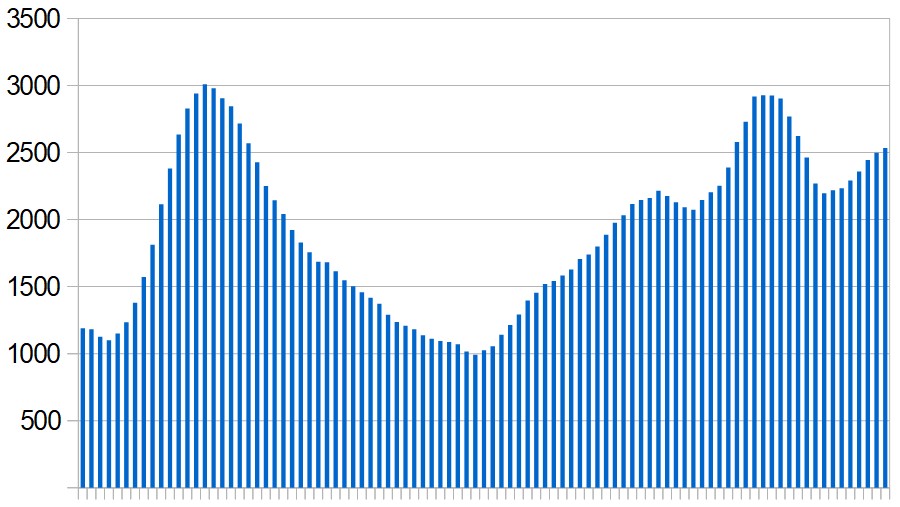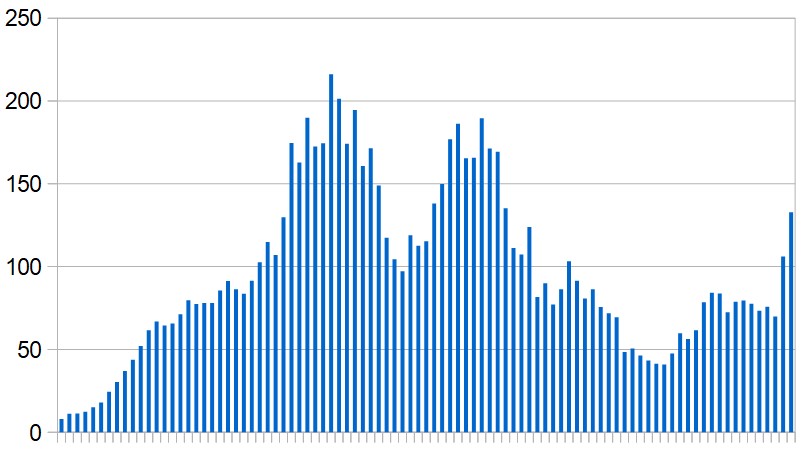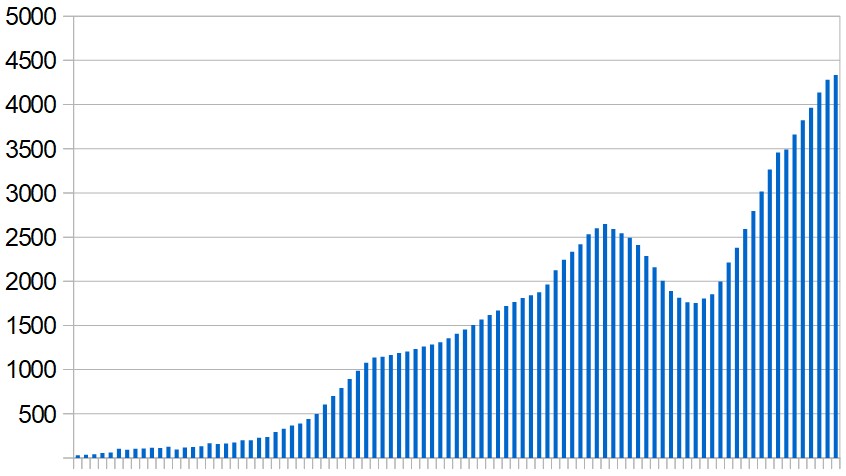Situation report: week ending 20 June 2020
REGIONAL OVERVIEW
The initial wave of Covid-19 infections has passed its peak in most countries of the Middle East and North Africa. Many of them have begun easing lockdowns and other restrictions, but in some of them new cases are rising again as a result.
This risks causing a second wave (as in Iran) but, there's a general reluctance to resort to further nationwide lockdowns and the focus is shifting towards localised lockdowns in specific hotspots, plus tracing of contacts.
Most countries in the region have reported problems with non-compliance by the public, either by failing to observe recommended precautions or flouting quarantine regulations.
The countries least equipped to cope with the epidemic are Yemen, Sudan, Iraq and Libya.
Detailed statistics for the region, based on official figures, can be found in this spreadsheet.
ALGERIA
Algeria has fared less badly than many expected, avoiding an exponential curve. New infections are increasing slowly but steadily. That is likely to continue without more extensive testing. The death rate in Algeria is higher than in most Arab countries.
For more details see: Covid-19 in Algeria
Confirmed cases: 11,504
New cases in past week: 806
Active cases: 2,483
Deaths: 825
Tests carried out: (unknown)
BAHRAIN
Migrant workers who often live in overcrowded conditions account for the majority of cases in Bahrain. New infections reached a peak on June 12 and have dropped back slightly since then. It's too soon to be sure if this is the start of a steady downward trend or just a temporary dip.
For more details see: Covid-19 in Bahrain
Confirmed cases: 20,916
New cases in past week: 3,203
Active cases: 5,572
Deaths: 57
Tests carried out: 463,000
EGYPT
Egypt's strategy is to minimise economic damage by "coexisting" with the virus until a vaccine comes along. The authorities appear to have succeeded in slowing the epidemic's growth but new infections show no sign of levelling off and health services are under strain, with medical staff complaining of inadequate protection. The Covid-19 death rate is the highest among the Arab countries. Despite that, Egypt hopes to start receiving foreign tourists again when its airports reopen on July 1.
For more details see: Covid-19 in Egypt
Confirmed cases: 52,211
New cases in past week: 10,908
Active cases: 36,266
Deaths: 2,017
Tests carried out: 135,000
IRAN
 |
Iran was the first country in the region to be seriously affected by the virus and is now in the midst of its second wave. Government figures show an initial wave of infections which peaked at the end of March. It subsided during April, briefly dipping below 1,000 new cases per day but the numbers have since risen again. New cases are currently averaging more than 2,000 a day. There's a good deal of scepticism about Iran's official statistics, and it's widely assumed that they understate the scale of the problem.
Confirmed cases: 200,262
New cases in past week: 17,737
Active cases: 31,678
Deaths: 9,392
Tests carried out: 1.4 million
IRAQ
Iraq has seen steep rises since early June and official figures are widely believed to understate the scale of the epidemic. Many cases go unreported because of social stigma, compliance with preventive measures appears to be low and health services are inadequate.
For more details see: Covid-19 in Iraq
Confirmed cases: 27,352
New cases in past week: 9,852
Active cases: 14,222
Deaths: 925
Tests carried out: 425,000
ISRAEL
Israel was relatively successful in controlling the initial wave of its epidemic but less successful in emerging from its lockdown. New infections peaked at around 600 a day in early April and by the second half of May had dropped to 15-16 a day. Most restrictions were lifted around the same time and as a result of that new cases have grown steadily throughout June, now averaging around 220 a day. A lot of the recent infections have occurred in schools.
For more details see: Covid-19 in Israel
Confirmed cases: 20,339
New cases in past week: 1,463
Active cases: 4,449
Deaths: 304
Tests carried out: 805,000
JORDAN
Jordan has been one of the most successful Arab countries in controlling the virus. There are still occasional local outbreaks but contact-tracing appears to be efficient. Most of the recently-reported cases have been imported – either returnees from abroad who were quarantined on arrival or cross-border truck drivers coming from Saudi Arabia.
For more details see: Covid-19 in Jordan
Confirmed cases: 1,008
New cases in past week: 93
Active cases: 291
Deaths: 9
Tests carried out: 318,000
KUWAIT
Kuwait appears to be over the worst. New infections peaked around May 25 and have almost halved since then. Migrant workers who often live in overcrowded conditions account for the majority of cases and many have now returned to their country of origin.
For more details see: Covid-19 in Kuwait
Confirmed cases: 38,678
New cases in past week: 3,726
Active cases: 8,175
Deaths: 313
Tests carried out: 349,000
LEBANON
In the midst of a political and economic crisis Lebanon is fortunate in having only about 1,500 recorded cases so far. Many of the recent infections have been among people returning from abroad. On Thursday the health ministry warned that there could still be "an uncontrollable surge" in Covid-19 cases as the lockdown measures and travel restrictions are lifted and said everyone who tests positive should be put in institutional isolation – either in hospital or an isolation centre.
For more details see: Covid-19 in Lebanon
Confirmed cases: 1,510
New cases in past week: 88
Active cases: 518
Deaths: 32
Tests carried out: 113,000
LIBYA
Libya is in its ninth year of internal conflict. The UN-backed Government of National Unity in Tripoli is challenged by Field Marshall Haftar's forces based in the east of the country. There are also numerous militias. This leaves the country ill-equipped to cope with a major epidemic. Growing levels of insecurity, political fragmentation and weak governance have led to a deterioration of basic services, particularly in the health system. At least 27 health facilities have been damaged or closed by fighting and some have been attacked directly. The number of confirmed infections is still small but testing is very limited. There are 870,000 people – refugees, asylum seekers and displaced persons – who the UN regards as especially vulnerable.
For more details see: Covid-19 in Libya
Confirmed cases: 520
New cases in past week: 111
Active cases: 427
Deaths: 10
Tests carried out: 19,000
MOROCCO
 |
A strict lockdown in Morocco has so far kept the number of known Covid-19 cases below 10,000. New infections fell to around 40 a day by early June but have been rising again since then.
For more details see: Covid-19 in Morocco
Confirmed cases: 9,613
New cases in past week: 930
Active cases: 1,283
Deaths: 213
Tests carried out: 506,000
OMAN
Oman's outbreak grew slowly until the end of May but it has seen a large rise in new cases since then. As in the other Gulf states, migrant workers have been disproportionately affected by the virus.
For more details see: Covid-19 in Oman
Confirmed cases: 27,670
New cases in past week: 5,593
Active cases: 13,571
Deaths: 125
Tests carried out: 506,000
PALESTINE
Palestine's outbreak is still small. In the West Bank its pattern broadly follows that of Israel, probably because of contact between the two. As in Israel, new cases have been rising recently – and very sharply during the last few days.
Fears of a major epidemic in Gaza have not materialised. Most of the known cases there are apparently due to contacts with Egypt.
For more details see: Covid-19 in Palestine
Confirmed cases: 954 (West Bank 687, Gaza 72, East Jerusalem 195)
New cases in past week: 285
Active cases: 235
Deaths: 5
Tests carried out: 45,000
QATAR
In population terms Qatar has more known cases than any other country – 30,000 per million inhabitants. Migrant workers have been disproportionately affected. Qatar's epidemic reached a peak in the first week of June and new cases have fallen steadily since then. The government has now embarked on a four-stage plan for lifting restrictions.
For more details see: Covid-19 in Qatar
Confirmed cases: 85,462
New cases in past week: 8,874
Active cases: 19,960
Deaths: 93
Tests carried out: 314,000
SAUDI ARABIA
 |
Saudi Arabia's epidemic shows no sign of abating. New cases reached an initial peak in the fourth week of May, then dropped back slightly before rising to new heights. Migrant workers have been disproportionately affected but the authorities have also complained about non-compliance with precautionary measures by Saudi citizens.
For more details see: Covid-19 in Saudi Arabia
Confirmed cases: 150,292
New cases in past week: 30,350
Active cases: 53,344
Deaths: 1,184
Tests carried out: 1.2 million
SUDAN
The coronavirus struck Sudan in the midst of a political transition following a popular uprising against the regime of President Bashir and the country is ill-equipped to cope with a major epidemic. Testing is very limited and official figures don't reflect the full scale of the outbreak. Most cases are said to be in and around the capital, Khartoum, but there's also concern about the Darfur area where large numbers of deaths are being reported, apparently caused by Covid-19.
For more details see: Covid-19 in Sudan
Confirmed cases: 8,316
New cases in past week: 1,437
Active cases: 4,724
Deaths: 506
Tests carried out: 401
SYRIA
Based on official figures (which some view with scepticism), Syria has very few confirmed cases. This may be because the Assad regime took preventive action before any infections had been officially recorded. More than 50 people have recently tested positive in connection with an outbreak centred on Ras al-Ma'ara, a town near Damascus which is now under lockdown. Several buildings have also been sealed off in Jdeidet al-Fadel (Quneitra province) where a woman diagnosed with the virus died on Tuesday. Nine of her contacts have tested positive.
Fears have been raised about north-western and north-eastern parts of the country which are outside the regime's control. Millions of displaced people are living in those areas and health services are often rudimentary. So far, only a handful of cases have been diagnosed in the north-east and none in the north-west.
For more details see: Covid-19 in Syria
Confirmed cases: 198
New cases in past week: 28
Active cases: 102
Deaths: 7
Tests carried out: (unknown)
TUNISIA
There is currently little or no transmission of the virus inside Tunisia though a few infections are still being detected among people arriving in the country. The government has announced that Tunisia will reopen its borders from June 27 and has begun promoting the country as a "safe" holiday destination.
For more details see: Covid-19 in Tunisia
Confirmed cases: 1,146
New cases in past week: 53
Active cases: 82
Deaths: 50
Tests carried out: 65,000
UNITED ARAB EMIRATES
The UAE's epidemic peaked in the last week of May when new cases were running at more than 900 a day. Numbers have fallen steadily since then and the current average is below 400 a day. Migrant workers have been disproportionately affected.
For more details see: Covid-19 in the UAE
Confirmed cases: 44,145
New cases in past week: 2,646
Active cases: 12,849
Deaths: 300
Tests carried out: 3 million
YEMEN
Because of the ongoing war, Yemen already faced a humanitarian crisis before the coronavirus arrived. Millions are malnourished and vulnerable to disease, and health services are inadequate. Official figures do not reflect the severity of the epidemic. Unusually large numbers of deaths are reported, many of them from symptoms resembling Covid-19 and hospitals often refuse treatment if coronavirus is suspected. The Houthis, who control the capital, Sanaa, and much of the north, have a policy of not reporting cases so as to avoid lowering morale and distracting from their war effort.
For more details see: Covid-19 in Yemen
Confirmed cases: 923
New cases in past week: 287
Active cases: 380
Deaths: 252
Tests carried out: (unknown)

 RSS Feed
RSS Feed
